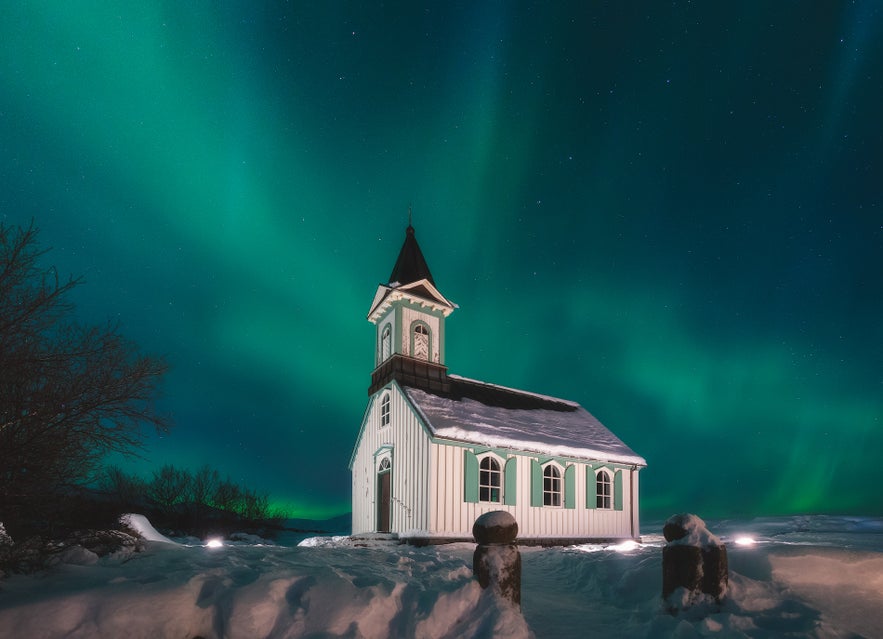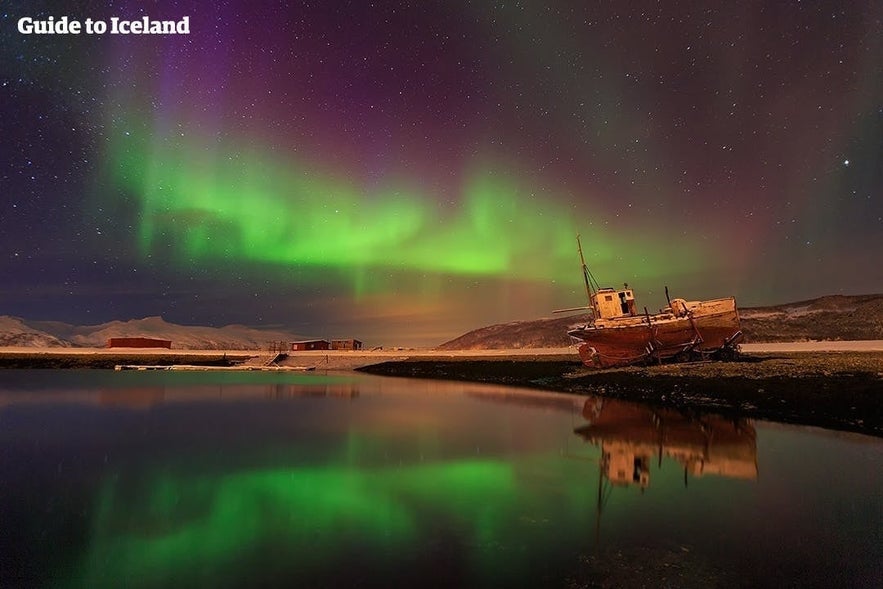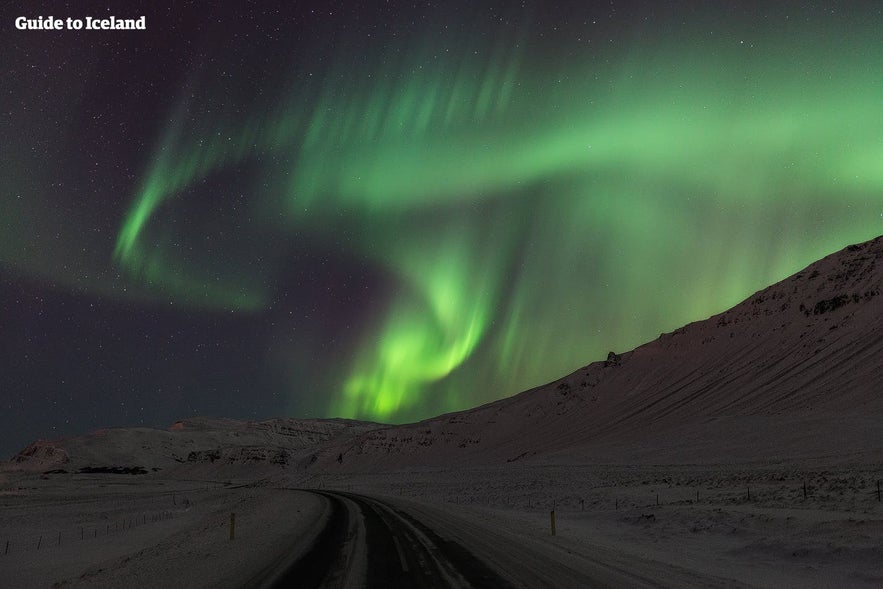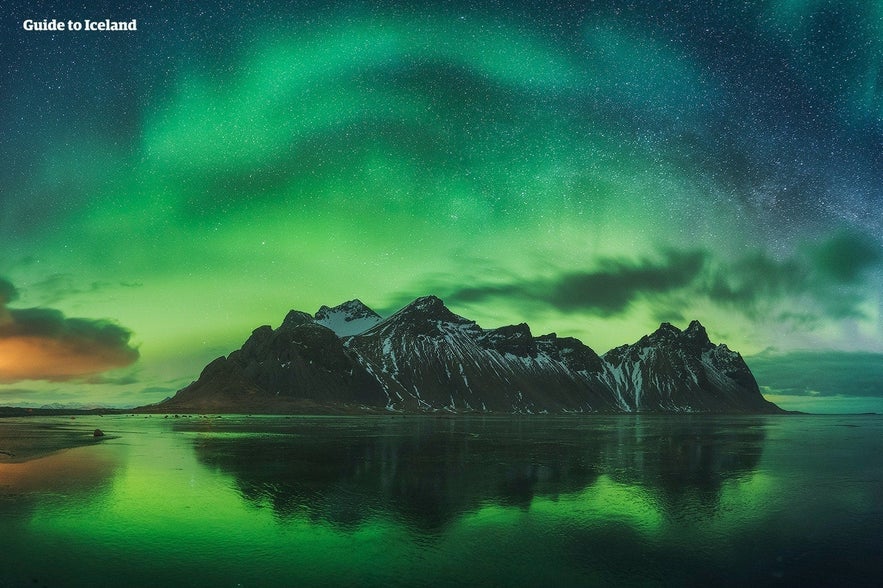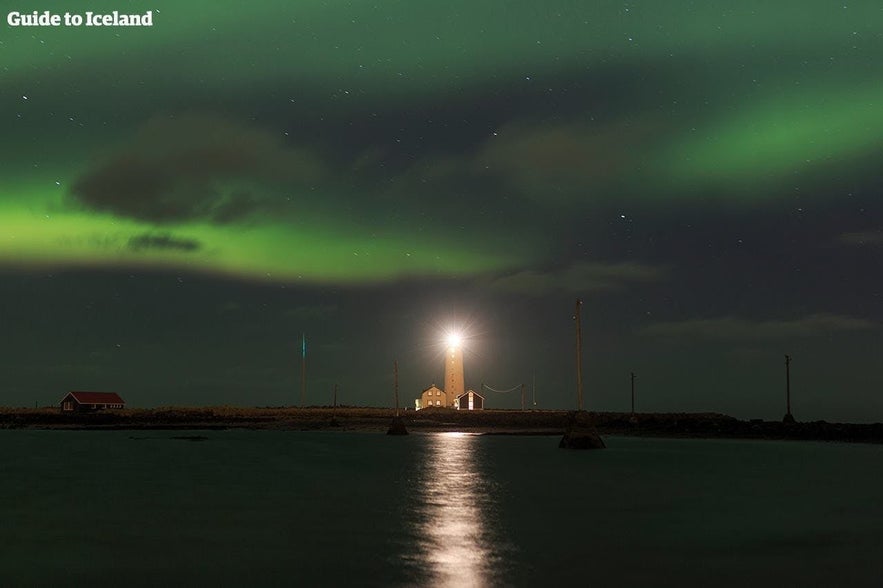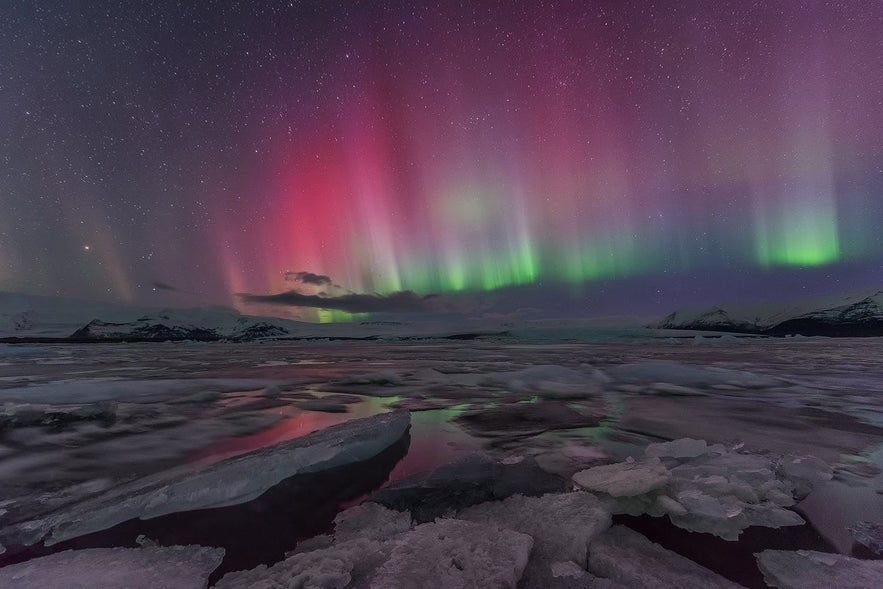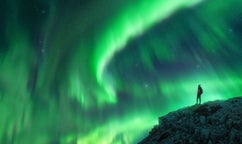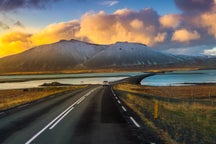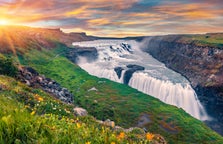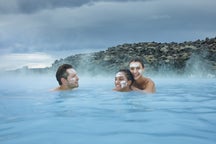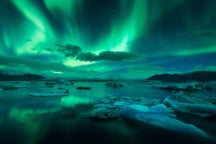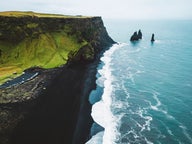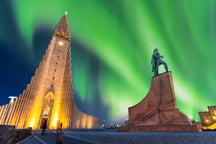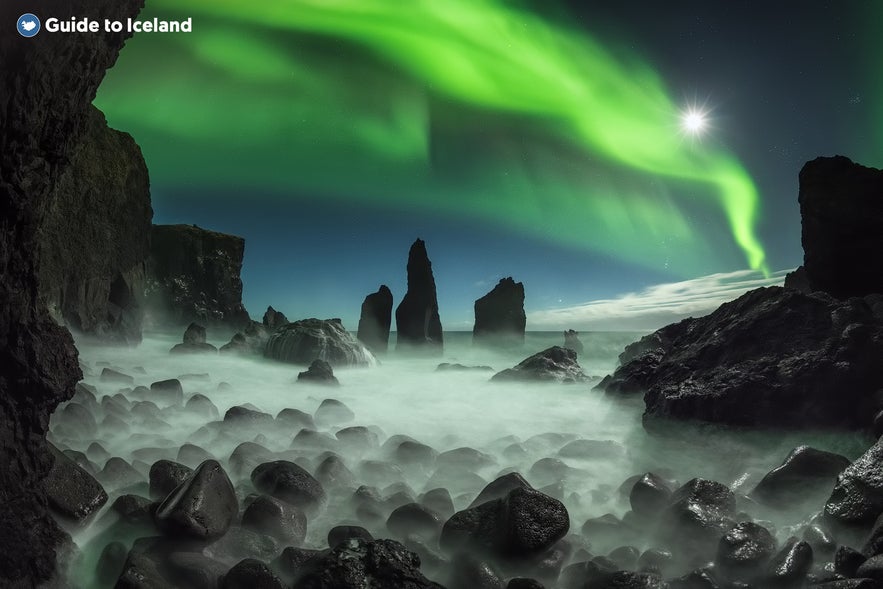
Learn all you need to know about witnessing the northern lights in Iceland with this comprehensive guide. Find the best locations for spotting the aurora borealis and uncover the ideal times of year to experience this natural wonder.
Heading out and going hunting for the northern lights is on the bucket list of many people. When the sky is clear during the dark winter in Iceland, you can spot them dancing in the sky in vibrant green, purple, and red colors. Combined with the stunning nature you can experience on vacations in Iceland, it's a truly incredible sight.
Why You Can Trust Our Content
Guide to Iceland is the most trusted travel platform in Iceland, helping millions of visitors each year. All our content is written and reviewed by local experts who are deeply familiar with Iceland. You can count on us for accurate, up-to-date, and trustworthy travel advice.
The sun reached the peak of its 11-year solar cycle last year, and activity still remains elevated in 2026. This continued surge of solar energy means brighter, more dynamic, and more frequent auroras, making 2026 one of the strongest years in over a decade for northern lights viewing.
The easiest way to see this natural phenomenon is to book guided tours that will take you to where the aurora is strongest and the light pollution is low enough for great visibility. Alternatively, you can stay in northern lights hotels; some even offer to give you a wake-up call when the aurora appears.
Another option is to rent a car and drive away from towns and cities and head to the countryside, where it's totally dark. You can check the northern lights forecast in Iceland before heading out to make sure there's no cloud coverage and how active the aurora is on a scale from 0 to 9.
Keep reading to learn all you need to know about the northern lights in Iceland, including when you can see them, how to read the forecast, what the best conditions are, and more!
What Are the Northern Lights?
Dancing in the skies above the land of ice and fire, these striking green lights are a true natural wonder. Yet, many don’t know what they are.
The northern lights, also known as the aurora borealis, are the visible result of solar particles entering the Earth’s magnetic field and ionizing high in the atmosphere. The ionization gives them their colors, usually green, but occasionally purple, red, pink, orange, and blue.
However, solar activity isn’t reliable and can be sporadic. So, even during a dark, clear night, Iceland might not have any northern lights. On the flip side, northern lights can occur in the atmosphere on a midsummer day, but the sun’s brightness prevents you from viewing them.
The Science Behind the Northern Lights
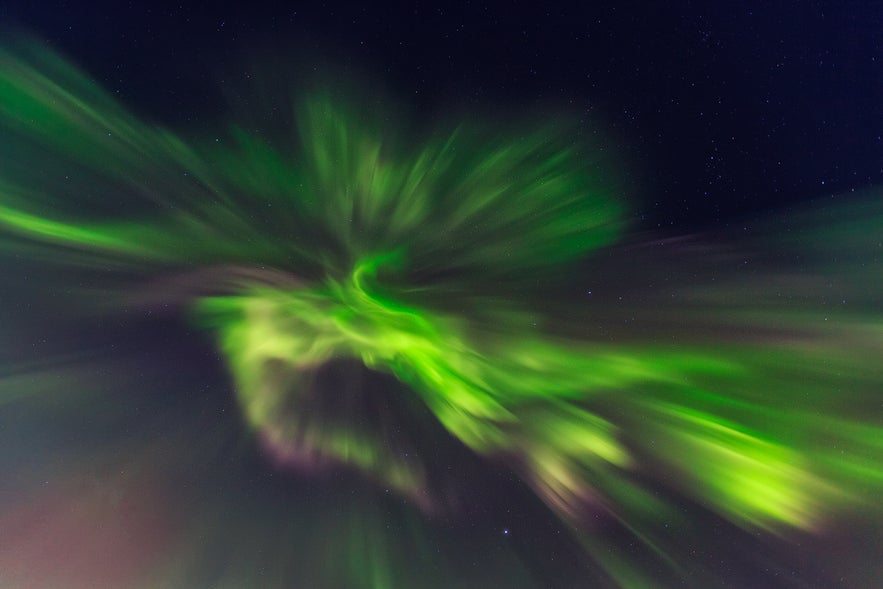 The aurora begins on the sun. Explosions such as solar flares and coronal mass ejections release streams of charged particles into space. When these particles reach Earth, our magnetic field pulls them toward the poles. As they collide with oxygen and nitrogen atoms high in the atmosphere, the atoms release light, forming the aurora.
The aurora begins on the sun. Explosions such as solar flares and coronal mass ejections release streams of charged particles into space. When these particles reach Earth, our magnetic field pulls them toward the poles. As they collide with oxygen and nitrogen atoms high in the atmosphere, the atoms release light, forming the aurora.
Auroras occur at both poles; aurora borealis in the north and aurora australis in the south. Iceland, at latitude 64°N, sits directly beneath the northern auroral oval, which is why it is one of the best places on Earth to see the northern lights.
The color depends on the type of gas and the altitude:
-
Green – oxygen at lower altitudes (the most common).
-
Red – oxygen at very high altitudes, during intense storms.
-
Blue and purple – nitrogen molecules reacting with solar particles.
The sun follows an approximately 11-year cycle of activity, ranging from quieter periods to dramatic peaks known as solar maximum. Solar Cycle 25 reached its peak last year, producing powerful aurora storms visible across Iceland. Solar activity remains elevated in 2026, continuing to generate frequent and vivid northern lights displays. Elevated solar activity has continued into 2026, meaning travelers can still expect frequent and vivid northern lights displays in Iceland.
Mythology and Legends of the Northern Lights in Iceland
Before science could explain the source of the dancing lights in the sky, different people told many stories about their origins. Strangely, the folklore about the aurora is richer in other parts of the world compared to Iceland.
Modern scholars have theorized that the Old Norse people might have thought the northern lights were the glinting of the shields and armors of the Valkyries. The Valkyries were female figures who guided warriors who died in battle to Valhalla. However, there are no mentions of the northern lights in the old Icelandic sagas, so these are just speculations.
In Finnish, the word for northern lights is "revontulet" which translates to "firefox." The Sami people of Finnish Lapland thought that the lights resulted from the firefox running across the snow so quickly that his tail threw sparks into the sky.
The auroras have also been considered omens. After Christianization in Medieval Europe, people saw them as a warning for dark times ahead.
Today, we understand the northern lights as a beautiful result of natural forces at play between the sun and Earth's magnetic field. However, their mesmerizing glow continues to inspire awe and wonder, just as they did centuries ago.
When is the Best Time to See the Northern Lights in Iceland?
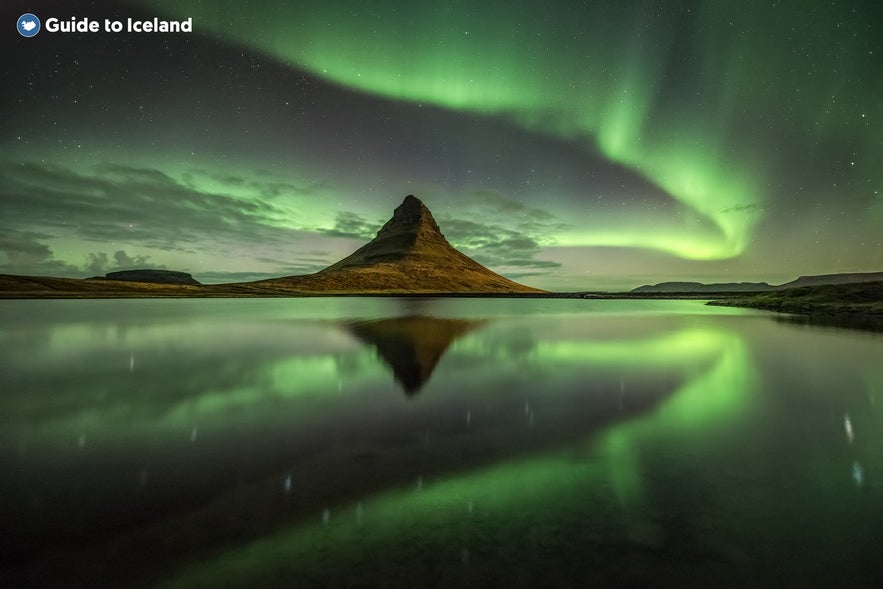
The best time to see the northern lights in Iceland is between late September and early April. While you can occasionally see them towards the end of August, the lingering sunlight makes them very faint.
The general rule is that the darker it is, the better the conditions are for seeing the most vibrant aurora. Iceland is very dark in the winter, reaching up to twenty hours of darkness during and around the winter solstice, which occurs on December 21st every year.
Understanding the Aurora Forecast
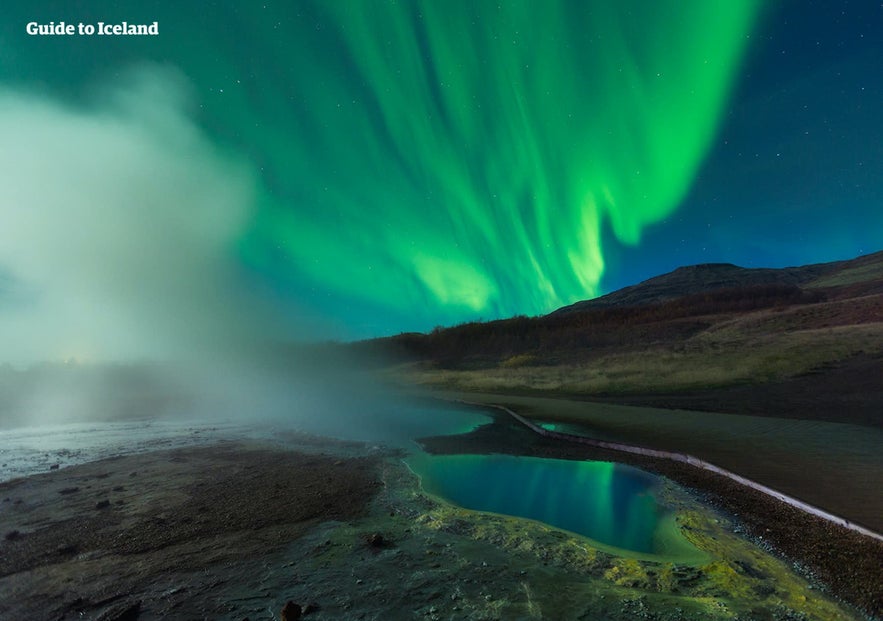 There are two things you need to pay attention to when looking at the northern lights forecast in Iceland:
There are two things you need to pay attention to when looking at the northern lights forecast in Iceland:
-
Cloud cover - Clear skies are the first requirement. Even the strongest aurora is invisible behind thick clouds. The fewer the clouds, the better your chances.
-
Kp index - This 0–9 scale measures geomagnetic activity and tells you how strong the aurora is expected to be. A higher number means brighter and more widespread northern lights.
On the map, green areas show cloud cover while white areas indicate clear skies. The Kp index is displayed in the box on the right. Keep in mind that this forecast only looks up to three days ahead, as longer-term predictions are not reliable.
The Kp Index Explained: How Strong Will the Aurora Be?
The Kp index explained:
-
Kp 0 - Silent: No geomagnetic activity. Auroras not visible.
-
Kp 1 - Very quiet: Auroras highly unlikely, but possible near the poles.
-
Kp 2 - Quiet: Faint auroras possible under clear, dark skies.
-
Kp 3 - Unsettled: Steady auroras likely, weaker near city lights.
-
Kp 4 - Active: Bright auroras likely, visible even with some light pollution.
-
Kp 5 - Minor storm: Strong auroras likely, often more than one color.
-
Kp 6 - Moderate storm: Vivid multi-colored auroras, widespread with movement.
-
Kp 7 - Strong storm: Intense auroras, fast-moving and multicolored.
-
Kp 8 - Severe storm: Extremely rare event; entire sky glows with brilliant, shifting colors.
-
Kp 9 - Intense storm: Historic storm; auroras so bright they can light the whole landscape.
Remember that the Kp index is only a prediction, much like a weather forecast. A Kp index above 5 is a rare event. A high Kp does not guarantee auroras, and a low Kp does not rule them out.
If the skies are dark and cloud-free, it’s always worth stepping outside and checking regularly; some of the best displays appear when least expected.
Beyond the Kp Index: Advanced Aurora Forecast Tools
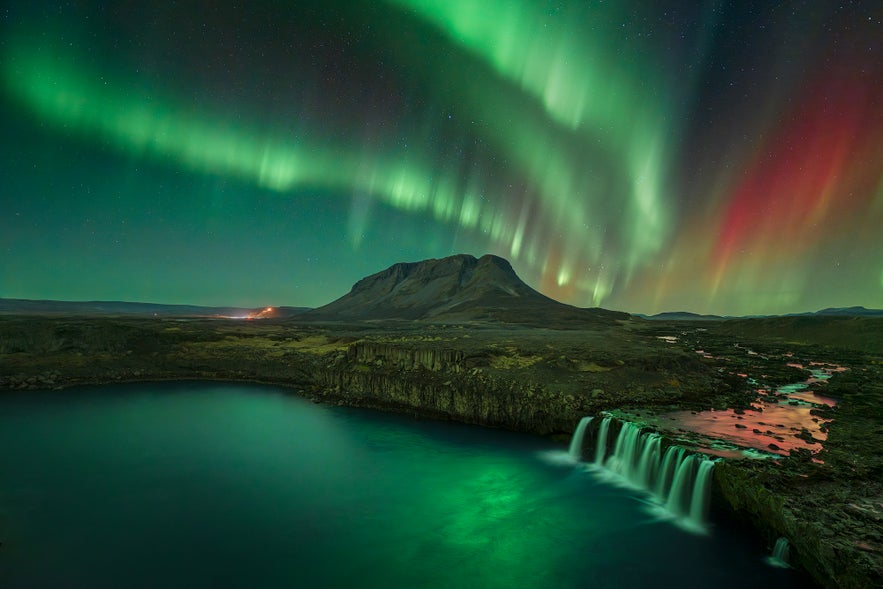 If you want to go beyond clouds and the Kp index, a few additional tools can give you a clearer picture of aurora conditions in Iceland:
If you want to go beyond clouds and the Kp index, a few additional tools can give you a clearer picture of aurora conditions in Iceland:
-
Bz component: The solar wind blows charged particles toward Earth, and those particles carry part of the Sun’s magnetic field with them. The Bz number tells us if that field is pointing in a direction that makes auroras more likely or not. A negative bz value = good, a positive bz value = not so good.
-
Solar wind speed: The solar wind is the stream of charged particles flowing out from the sun. When it moves faster, it pushes harder on Earth’s magnetic field and creates more active auroras. Typical speeds are around 300–400 km/s, but if it jumps above 500 km/s, the chance of brighter northern lights increases.
-
OVATION model: This is a computer model that uses live solar wind data to predict aurora activity for the next 30 to 90 minutes. It’s usually shown as a world map with a glowing oval around the poles. The brighter and larger the oval over your area, the better your chances of seeing the lights.
You can check the Bz component and solar wind speed on NOAA’s Real-Time Solar Wind dashboard, and the OVATION model on NOAA’s Aurora 30-Minute Forecast map.
Best Aurora Forecast Apps for Northern Lights in Iceland
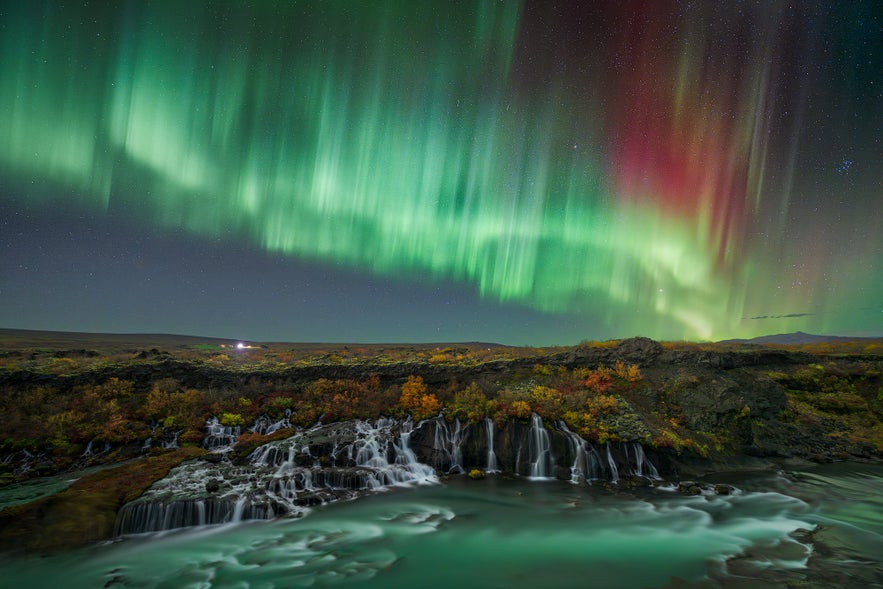 Beyond the Icelandic Meteorological Office's northern lights forecast in Iceland, several mobile apps can help you track and find the northern lights:
Beyond the Icelandic Meteorological Office's northern lights forecast in Iceland, several mobile apps can help you track and find the northern lights:
-
Hello Aurora – An Iceland-made app with real-time aurora forecasts, cloud cover, solar wind data, and live reports from other users in your area. You can find the app here: Hello Aurora on the App Store and Hello Aurora on Google Play.
-
My Aurora Forecast & Alerts – A popular global aurora app offering Kp forecasts, solar wind updates, and customizable alerts. You can find the app here: My Aurora Forecast & Alerts on the App Store and My Aurora Forecast & Alerts on Google Play.
If you want to increase your chances of finding the northern lights in Iceland even further, a useful insider trick is to join local aurora-hunting groups on Facebook or community forums. People often post real-time updates when the lights become visible, which can give you an early heads-up and save you from waiting outside for hours.
You can also find several live webcams across Iceland that stream the night sky, which makes it easy to check in real time whether auroras are visible before heading out.
Why 2026 Is Exceptional for Northern Lights in Iceland
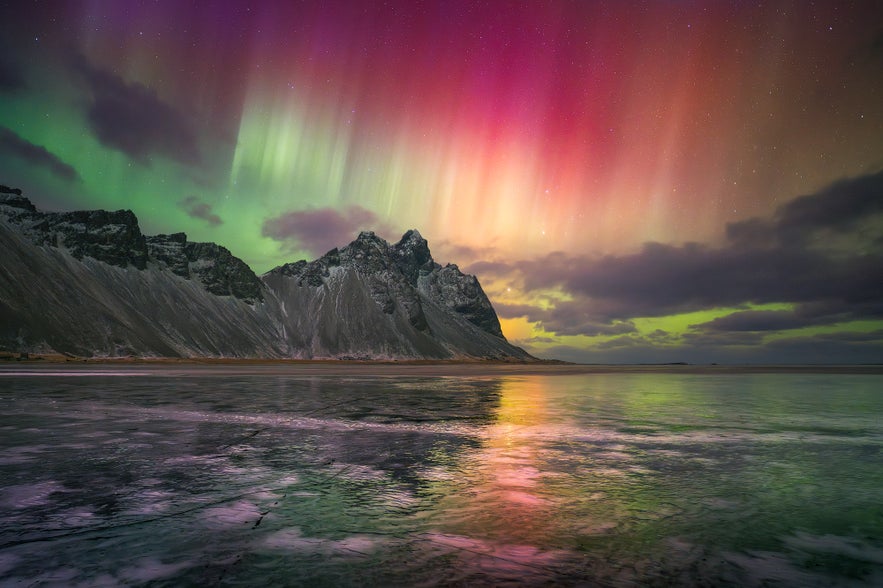 The 2026 season is predicted to become one of the best years in over a decade to see the northern lights in Iceland. The reason is that the sun just reached the peak of its 11-year solar cycle, known as the solar maximum. During this phase, solar activity is much stronger, resulting in brighter and more frequent auroras.
The 2026 season is predicted to become one of the best years in over a decade to see the northern lights in Iceland. The reason is that the sun just reached the peak of its 11-year solar cycle, known as the solar maximum. During this phase, solar activity is much stronger, resulting in brighter and more frequent auroras.
Scientists confirmed that Solar Cycle 25 began in December 2019 and reached its peak in 2025, according to NASA and NOAA. Updated forecasts from the NOAA Space Weather Prediction Center showed that this cycle was more active than first expected, with ideal conditions for aurora viewing.
Travelers witnessed spectacular aurora storms across Iceland in 2025, including rare red and purple displays. NOAA reports that Solar Cycle 25 remains near peak levels, with elevated geomagnetic activity continuing into 2026, giving visitors another strong season for northern lights viewing.
After 2026, activity will gradually decline toward the next solar minimum, expected around 2031, so the upcoming season is a rare chance to see the northern lights in Iceland at their most powerful.
How To See the Northern Lights in Iceland
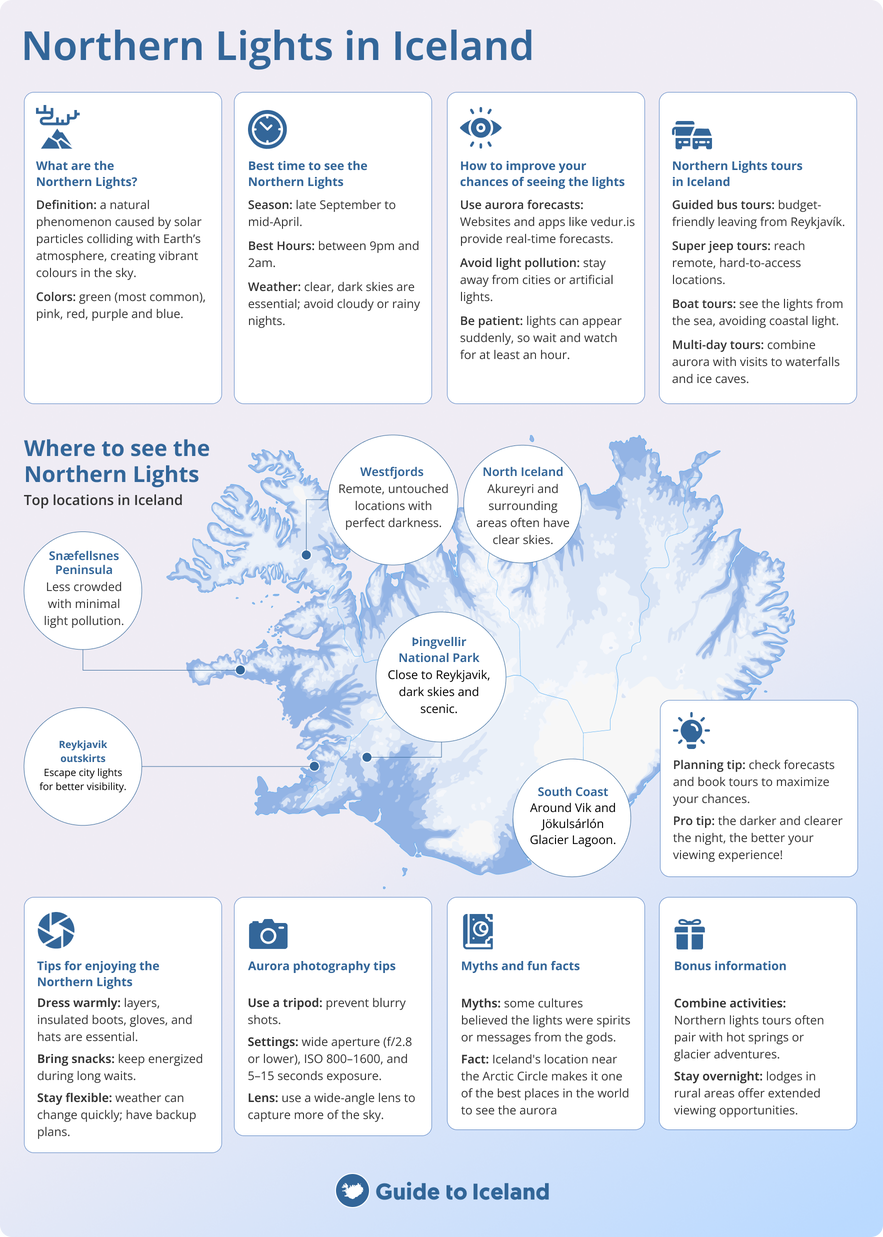
-
Take a guided tour, such as this budget-friendly northern lights bus tour.
-
Go out of town and search for them by renting an affordable car.
-
Hunt for them in the town where you’re staying.
-
Set off into the ocean on a boat tour, such as this fantastic two-hour northern lights boat tour.
We’ll cover each of them below, starting with the best places to see the northern lights in Iceland.
Where to See the Northern Lights in Iceland
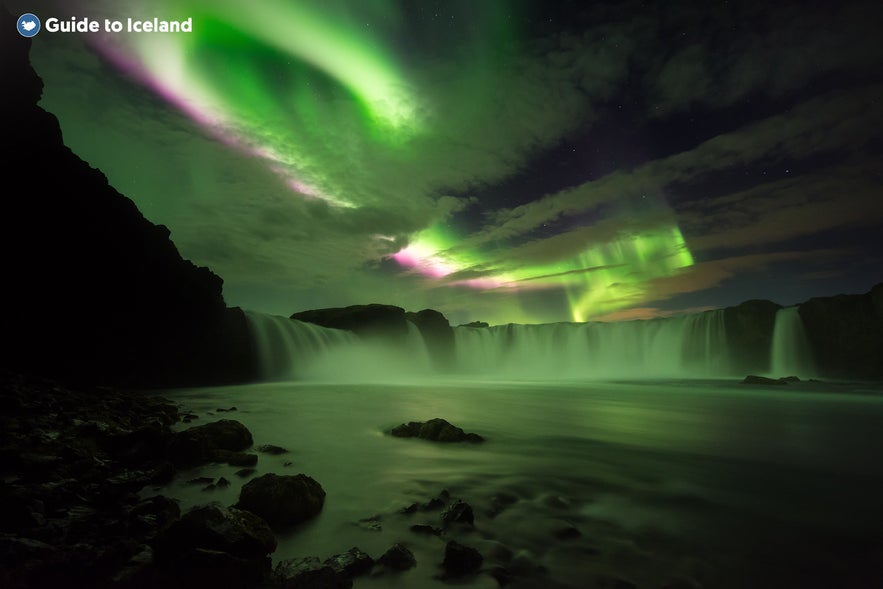 “Where can I see the northern lights in Iceland?” is a common question by travelers when planning their trip. If the conditions are favorable, you can see the northern lights anywhere in Iceland, but it’s easier and more scenic in some places than others.
“Where can I see the northern lights in Iceland?” is a common question by travelers when planning their trip. If the conditions are favorable, you can see the northern lights anywhere in Iceland, but it’s easier and more scenic in some places than others.
It’s worth examining where you’ll stay in Iceland if you want to hunt for the auroras. Ideally, you’ll want to find a place with as little light pollution and cloud coverage as possible.
Many of Iceland’s most stunning natural sites are popular places to see aurora borealis. Some examples include Thingvellir National Park in Southwest Iceland, the Asbyrgi Canyon in North Iceland, and the Kirkjufell Mountain on the Snaefellsnes peninsula.
Read on for some of the best places to see the northern lights in Iceland.
Northern Lights in North Iceland
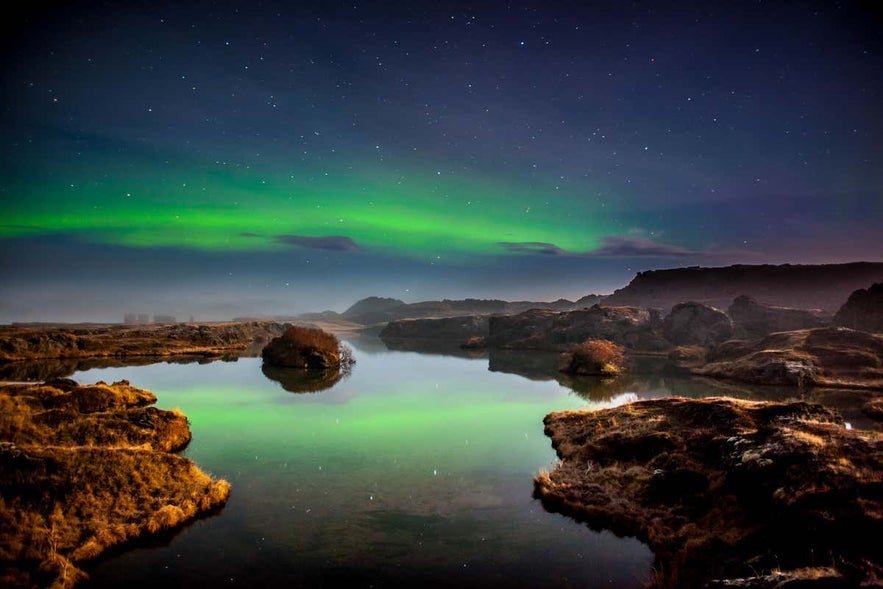
North Iceland has longer hours of darkness and typically less cloud cover than other areas, making it the ideal region for watching the aurora borealis.
The only exception is Akureyri because it’s the second-largest city in Iceland. Although it is possible to see the northern lights in Akureyri, the light pollution makes it less ideal to view them. You can, however, take this northern lights hunt tour from Akureyri, which brings you away from the town's light pollution to good viewing spots!
- Discover the 11 Must-See Destinations in North Iceland
- See also: 13 Best Things to Do in Akureyri (and Nearby)
Northern Lights in South Iceland
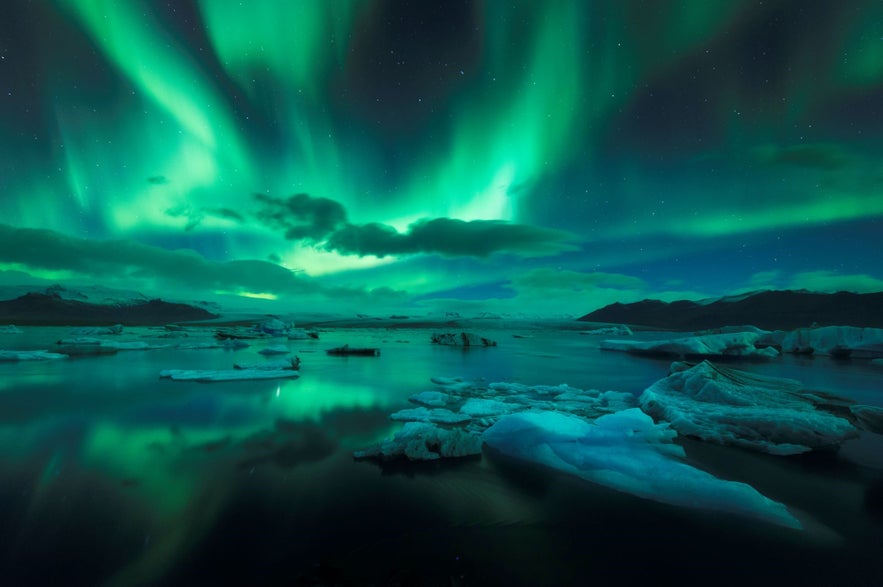 The many beautiful locations along Iceland's South Coast also present great opportunities to see the northern lights. The best place to see the northern lights in Iceland is the Jokulsarlon glacier lagoon, which lies by the Vatnajokull glacier.
The many beautiful locations along Iceland's South Coast also present great opportunities to see the northern lights. The best place to see the northern lights in Iceland is the Jokulsarlon glacier lagoon, which lies by the Vatnajokull glacier.
You can drive to the Jokulsarlon glacier lagoon along the Ring Road from Vik or find one of the black sand beaches of south Iceland to enjoy the view of the lights dancing across the sky.
- Discover the Northern Lights at Jokulsarlon Glacier Lagoon
Camping in Iceland to See the Northern Lights
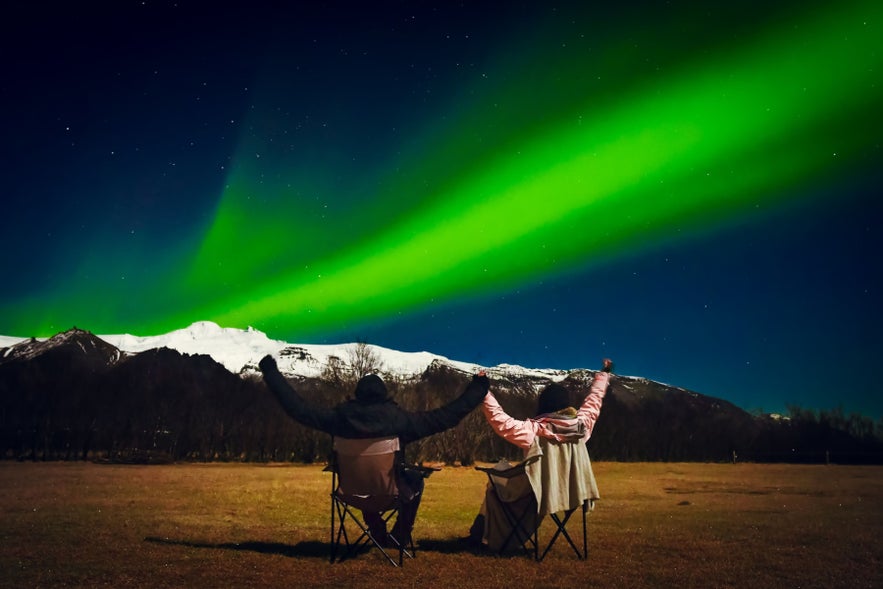 The best places in Iceland to see the northern lights without paying extra are campgrounds and glamping experiences. However, it’s only recommended to camp in Iceland between April and September because of the cold winter. It's possible to go in the fall and early spring if you're traveling with a rental campervan with heating, but avoid the height of winter.
The best places in Iceland to see the northern lights without paying extra are campgrounds and glamping experiences. However, it’s only recommended to camp in Iceland between April and September because of the cold winter. It's possible to go in the fall and early spring if you're traveling with a rental campervan with heating, but avoid the height of winter.
Many campsites are rural, meaning the light pollution will be minimal. During the beginning of April and end of August, travelers may see the northern lights. However, the rest of the camping season is typically too bright for them to appear.
Of course, there’s always a slight chance that you still might not see them even if you take every opportunity. You might also see them on the plane over to Iceland or on the drive from Keflavik Airport. Keep in mind that luck is always a factor when hunting the aurora in Iceland.
- Learn about Camping in Iceland
How to See the Northern Lights in Reykjavik
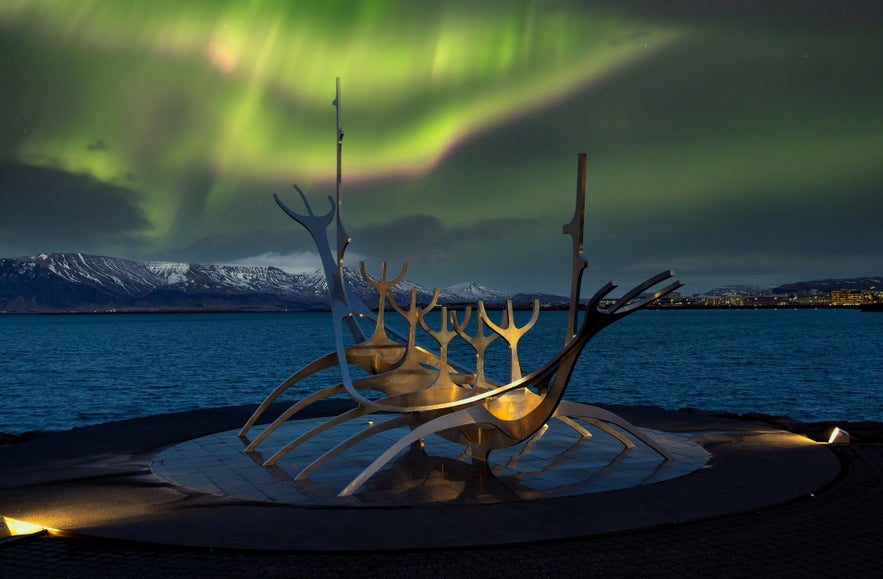
Even if you’re only visiting the capital, you still have a chance to see the northern lights in Reykjavik. By booking a hotel in Reykjavik, you have a wide variety of options to see the aurora, both within the city and outside it.
The best way to see the northern lights in Reykjavik is the same way as anywhere else in Iceland. You need to find the darkest place possible and fully clear skies, then wait until your eyes have adjusted.
Reykjavik has many parks where you can minimize light pollution and maximize your chances of spotting the northern lights. Read on for the best places to see the aurora borealis in Reykjavik.
Seltjarnarnes Peninsula
Seltjarnarnes peninsula is the northwesternmost point of the capital region. There’s minimal light pollution along this stretch. You have a great shot at spotting them on clear nights with a good forecast. One of Reykjavik's best backdrops for the northern lights is at the Grotta lighthouse.
There’s also a little geothermal tub on the peninsula called Kvika Foot Bath, where you can warm up your feet while waiting for them to show.
Oskjuhlid Hill
Oskjuhlid hill is another excellent place to hunt the aurora borealis in Iceland. The forest that surrounds the Perlan Museum is very dark, so observing the sky from one of its clearings often achieves excellent results.
Public Parks in Reykjavik
You can find relatively dark areas in some of the parks in Reykjavik. Popular options include Klambratun, Hljomskalagardur, or the larger Ellidaardalur. The first two are within walking distance of the city center, but Ellidaardalur is best reached by rental car.
Downside of Northern Lights Hunting in Reykjavik
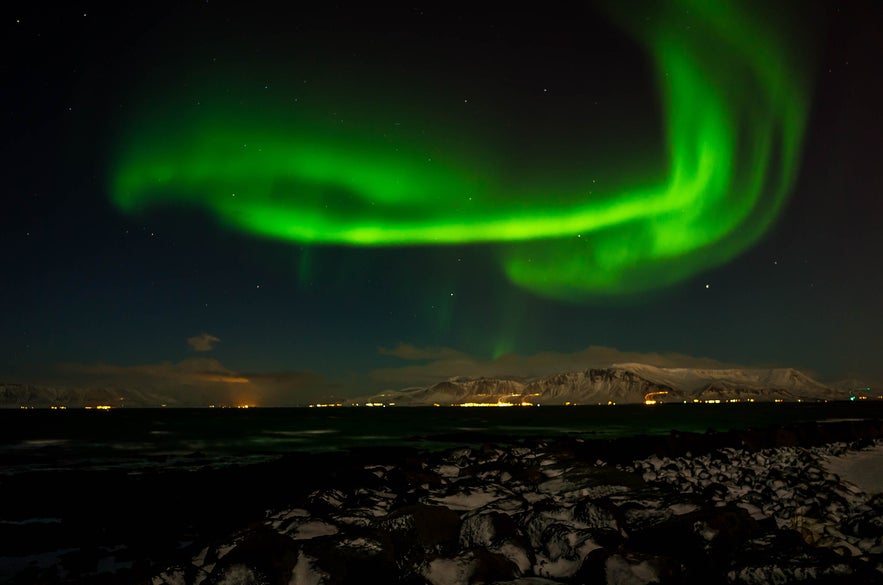
Photo from Wikimedia, Creative Commons, by sergejf. No edits made. Northern lights over Reykjavik.
Unfortunately, trying to see the aurora borealis in Iceland in urban areas has several disadvantages:
-
There will always be more light pollution in towns and cities than in the untouched landscapes of Iceland’s countryside.
-
If there is a cloud blocking the best view of the auroras, you can’t reposition yourself for an optimal viewing experience.
When the auroras are incredibly vibrant, you might see them from urban areas, even with light pollution, such as from a garden, Reykjavik hotels, or just from the street. But the darker your surroundings, the more intense the colors will be.
To maximize your chances of seeing the northern lights in Iceland, we always recommend a guided tour that brings you straight to the best viewing spots.
Can You See the Northern Lights From the Blue Lagoon?
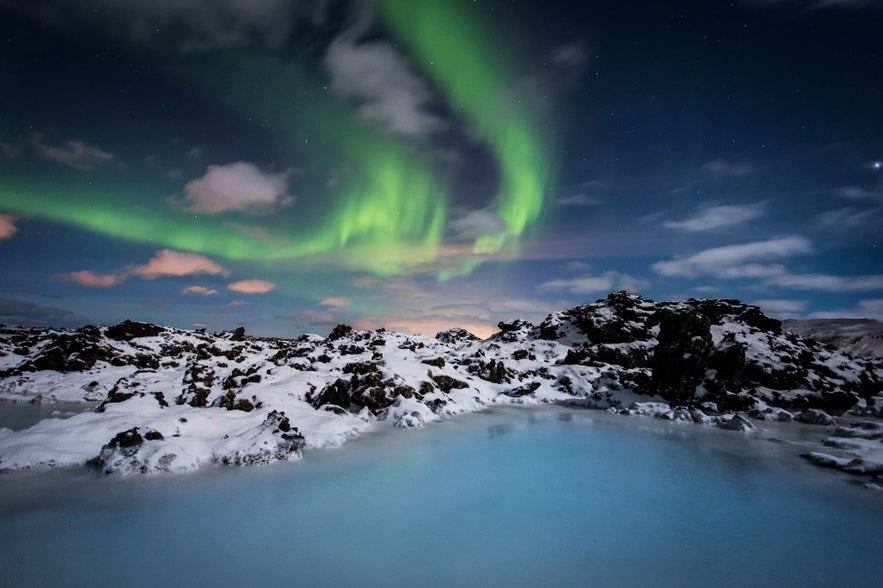 Yes, you may be able to see the northern lights from the Blue Lagoon. Much like trying to spot aurora borealis anywhere else in Iceland, it depends on the weather conditions and solar activity.
Yes, you may be able to see the northern lights from the Blue Lagoon. Much like trying to spot aurora borealis anywhere else in Iceland, it depends on the weather conditions and solar activity.
Since the Blue Lagoon is away from the city, there’s less light pollution than in Reykjavik. But being a very popular attraction, you must book your Blue Lagoon tickets with good notice. These advanced bookings mean it’s unlikely that you will be able to adjust your visit if the weather conditions are not optimal for the northern lights to be visible.
So the chance of seeing the aurora borealis while you’re soaking in the mineral water there depends highly on luck. Consider visiting a few of the different geothermal pools and hot springs around Iceland to enjoy both the Icelandic bathing culture and, possibly, the northern lights.
- Learn about Iceland's Blue Lagoon: The Ultimate Travel Guide
- See also: Blue Lagoon vs. Sky Lagoon: Which One Should You Visit?
Photographing the Northern Lights in Iceland
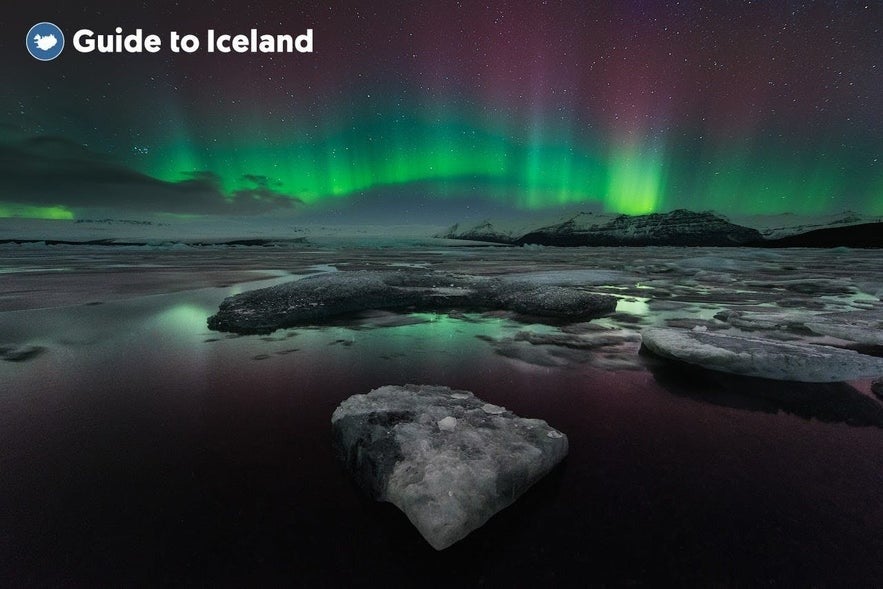 Photographing the northern lights can be tricky. Most phones won't capture the magic of the lights, and most of the photographs shown here were captured with professional cameras. If you want a go at photographing them yourself, here’s a quick summary:
Photographing the northern lights can be tricky. Most phones won't capture the magic of the lights, and most of the photographs shown here were captured with professional cameras. If you want a go at photographing them yourself, here’s a quick summary:
-
Use a DSLR or full-frame camera with ISO capabilities. A mirrorless camera works, too, but it’s not as ideal.
-
Use a wide-angle (or even ultra-wide-angle) lens as well.
-
Use a tripod and a shuttle release to keep your camera steady, too.
-
Set the ISO around 1,600 and an aperture of f/2.8 or lower.
Photography is an art, and these settings are just a guideline. If you’re unsure, you can go on a special northern lights tour with a photographer, where you can get the best photos of the aurora borealis and Iceland’s beauty in the winter.
- Learn all about How to Photograph the Northern Lights
Best Apps to Photograph the Northern Lights With a Smartphone
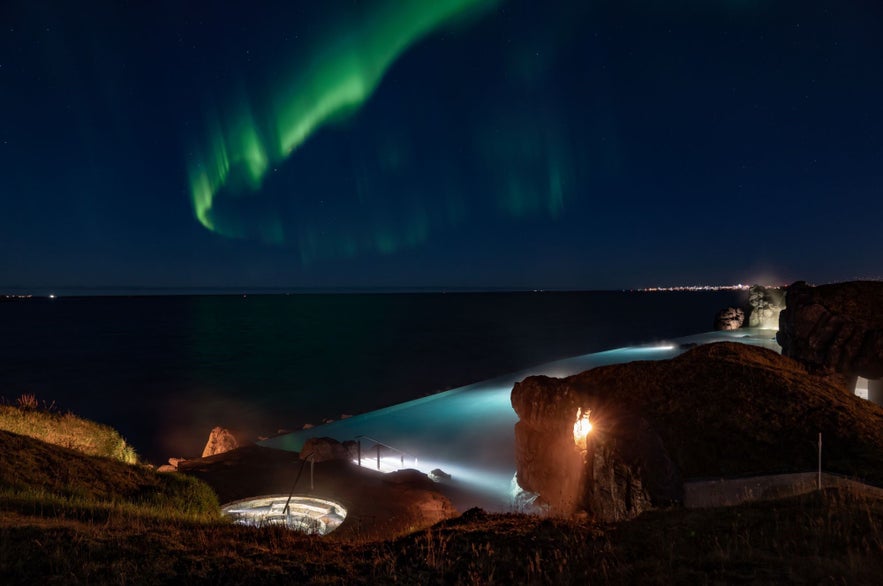 Usually, you won't be able to get high-quality photos of the northern lights with your phone, but you don't need to stress if you don't have a proper camera. Mobile phone cameras are getting better every day, and while they can’t compete with the capabilities of DSLR cameras, here are some apps that can help you get a few decent shots:
Usually, you won't be able to get high-quality photos of the northern lights with your phone, but you don't need to stress if you don't have a proper camera. Mobile phone cameras are getting better every day, and while they can’t compete with the capabilities of DSLR cameras, here are some apps that can help you get a few decent shots:
These apps either lower the shutter speed or compile a series of photos together to create one shot. We recommend you read the reviews and decide which one is best for you.
- See also: Top 10 Apps for Traveling in Iceland
Hunting the Northern Lights on a Guided Tour in Iceland
The most common way to hunt for the aurora borealis in Iceland is by taking a northern lights minibus tour from Reykjavik. The mobility and affordability make this the best way to see the northern lights in Iceland.
These tours run regularly from September to April, whenever the northern lights are visible. If the outings are canceled or unsuccessful, the tour company usually offers you a second opportunity to see them for free.
Advantages of choosing northern lights tours:
-
You’ll be under the guidance of an aurora expert.
-
You’ll be mobile enough to move to where the forecast is most favorable, and the cloud cover is minimal.
-
You won’t need to worry about driving in Iceland’s winter conditions.
-
As a bonus, they take you to places and landscapes you might never see otherwise.
If you want a full winter adventure, this 3-day trip in Iceland, in addition to a northern lights hunt, includes the South Coast in winter and the Jokulsarlon glacier lagoon, the famous Golden Circle, and engaging in an adventurous glacier hike.
Those on a budget will appreciate joining a northern lights bus tour from Reykjavik, which takes you to the most promising locations without breaking the bank. You can book tours like this in Akureyri as well, like this northern lights tour near Lake Myvatn.
Those less worried about the cost—or just keen for a more personal, immersive experience—can elect to take a private northern lights tour from Reykjavik that includes a comfortable vehicle and private driver.
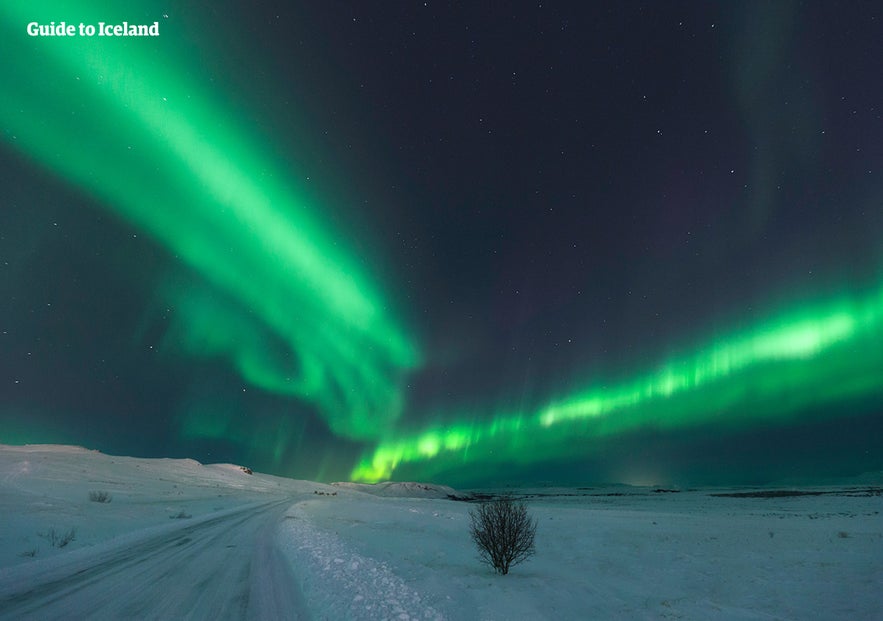
By being in much smaller groups, you have more opportunities to speak with your guide and fewer people around you while you’re watching the northern lights. You’ll also be able to reach places larger buses can’t go and get to the most remote viewing locations.
Combining a guided northern lights tour with other experiences is also magical, such as with this northern lights and Golden Circle tour from Reykjavik.
If you’re not a fan of group tours, we recommend you go on your own one-week self-drive northern lights hunting tour so you can go aurora hunting at your own pace. Just be mindful that you'll have to drive in frosty and likely snowy conditions.
Hunting the Northern Lights with a Rental Car in Iceland
If you have a valid driver’s license in the Latin alphabet, you can easily hunt for the northern lights yourself by renting a car. When driving in Iceland in winter, it's best to rent a 4x4 vehicle, as conditions can be challenging.
This means no other group members will be distracting you on your tour, there are no time limitations, and you can choose where to look for the aurora borealis in Iceland yourself.
Before choosing to head on winter self-drive tours, it’s essential to be aware that driving in Iceland can be tricky during winter. Here are a few things to remember:
-
While the roads are mostly ice-free in September, October, and April, they can be harder to drive from November to March.
-
All rental cars in Iceland have studded tires during the winter. Even if you feel comfortable driving, renting a four-wheel-drive vehicle is still recommended.
-
You should also check the road conditions and the weather forecast before departing to ensure that your intended destination is accessible.
-
If you have little experience driving in snowy conditions and rural areas, you may feel more comfortable on a guided tour.
It's best to evaluate your driving capabilities realistically, as you don't want to take unnecessary risks.
- For more, check out Driving in Iceland: The Ultimate Guide to Road Trips
- See also: Best Advice For Renting a Car in Iceland
Hunting the Northern Lights by Boat in Iceland
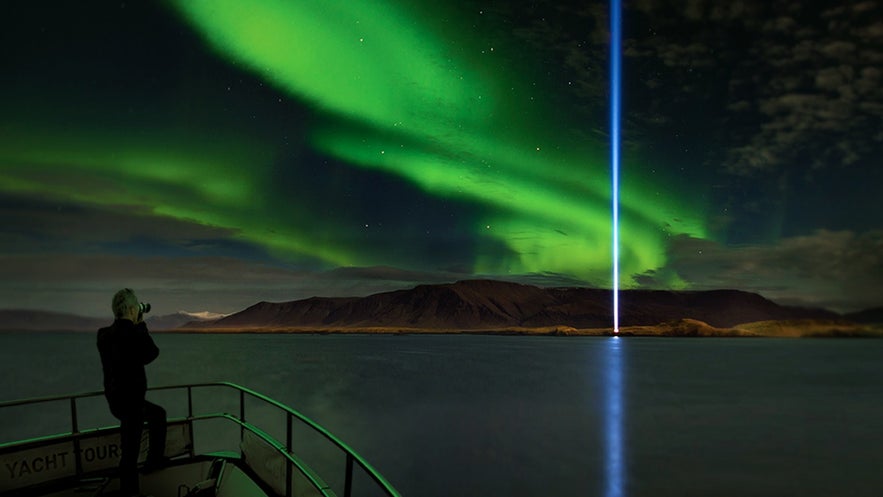
Finally, a fantastic way to enjoy the incredible phenomenon of the aurora borealis in Iceland is with this northern lights boat cruise from Reykjavik.
Boat tours like that one take you out to sea, far from any light pollution, and offer you a fantastic opportunity for a sighting. They are very convenient and head straight out to Faxafloi Bay from the Reykjavik harbor.
You won’t have to travel far from the port to be clear of city lights and catch a sighting. While you won’t have the same mobility as a standard bus or super jeep tour, you’ll have a more unique experience.
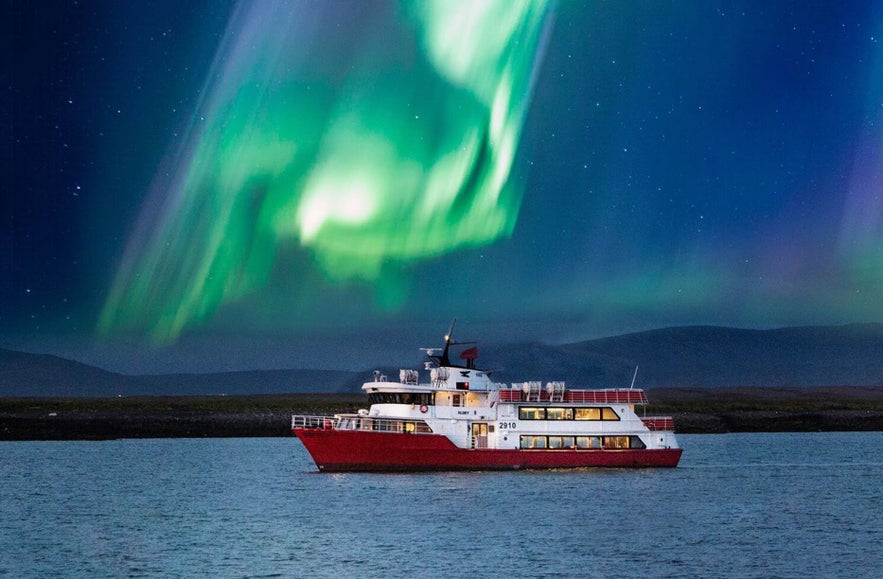
However, a boat trip’s primary advantage is not the hunt for the northern lights. Instead, it’s about enjoying being out on the sea, surrounded by beautiful landscapes while floating under a canopy of stars.
If there’s no aurora to be enjoyed, most tours will offer you a complimentary second chance.
A northern lights cruise in Faxafloi Bay could also result in a bonus whale-watching experience with this whale-watching and northern lights tour from Reykjavik or this combination tour from Akureyri.
After all, whales are common along Iceland’s shores, and both bodies of water are home to resident white-beaked dolphins and harbor porpoises. Minke whales are more commonly spotted from Reykjavik, while Humpbacks are regular visitors to the northern waters, though you’ll usually see these in the summer.
- Learn more with the Best Guide to Whale Watching in Iceland
What to Wear for a Northern Lights Hunt in Iceland
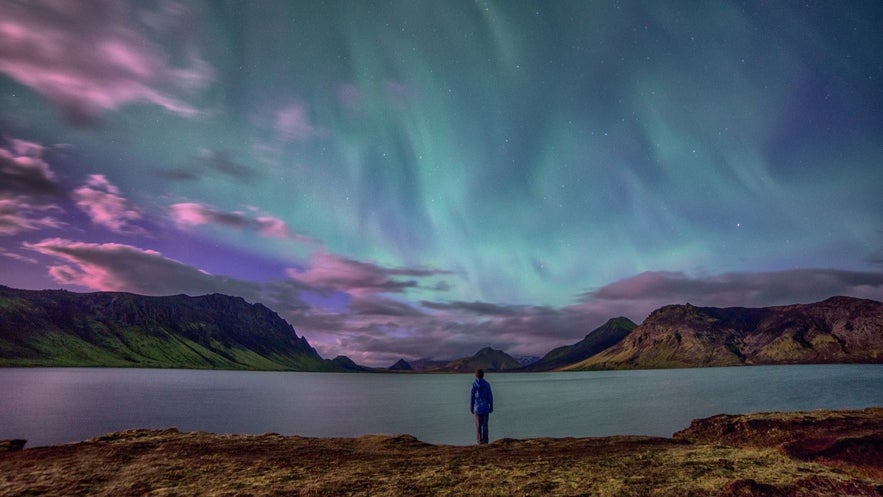
When preparing to hunt for the northern lights in Iceland, dressing appropriately is essential due to the country's unpredictable and often cold weather. You'll likely be standing outside for long periods of time, so it's better to over-prepare!
Opting for layers is key; start with thermal base layers to retain body heat, followed by insulating middle layers, like a fleece or down jacket, to trap warmth. A waterproof and windproof outer layer is crucial to shield you from the elements, ensuring comfort as you gaze at the night sky.
Footwear should also be a top consideration. Wear insulated, waterproof boots that offer both warmth and traction to navigate icy or snowy terrains safely. Don’t forget accessories such as warm wool socks, gloves, and a good hat to minimize heat loss through extremities. It's also a good idea to bring a thermos with a hot drink to help warm you up from the inside out!
Always check the weather forecast and be prepared to adapt your attire to the conditions of the night, ensuring a memorable and comfortable northern lights experience.
- See also: What To Pack for Iceland for All Seasons
Are Northern Lights Guaranteed in Iceland?
To witness the aurora borealis in Iceland, you need patience, luck, and the following conditions:
-
You must visit between September and April. While you can occasionally see them towards the end of August, the lingering sunlight makes them very faint.
-
The night must be as dark as possible. For example, a fuller moon will dim the aurora.
-
There should be as little unnatural light as possible (avoid watching under artificial lights).
-
There should be as little cloud cover as possible, as northern lights occur much higher in the earth's atmosphere than clouds.
-
There must be enough solar activity. The aurora forecast is measured on a scale of 0-9 Kp-index, with anything above two usually promising for visibility at Iceland’s latitude.
You can research these last two conditions before looking for the lights by referencing the cloud cover forecast and the aurora forecast in Iceland. However, it’s impossible to know the forecasts more than a few days in advance.
Contrary to popular belief, colder weather does not affect whether the northern lights in Iceland will appear.
Even if all the conditions listed above seem perfect, nature can be fickle, and the northern lights still may not show. It’s a probability game, so the best chance of seeing the aurora borealis in Iceland is to stay longer. Keep this in mind when you book a vacation in Iceland.
Top Northern Lights Hotels in Iceland with Wake-Up Calls
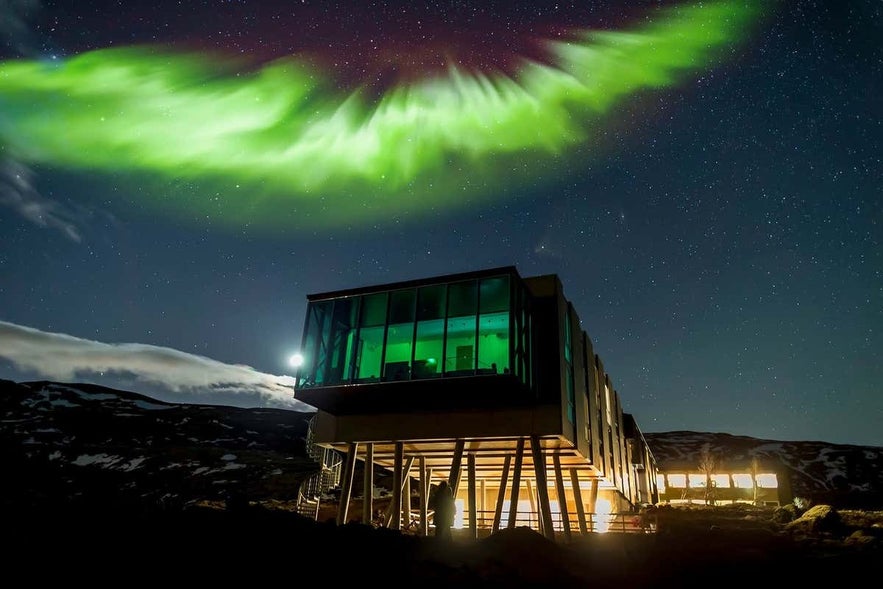
The best northern lights hotels in Iceland are in remote locations with no light pollution. Many hotels offer northern lights wake-up service during the winter season, so guests don’t miss out on the spectacular aurora.
Here are 8 of the best hotels in Iceland that offer northern lights wake-up calls for their guests.
Hotel Ranga
Hotel Ranga in South Iceland is a luxury countryside retreat located in Hella, about 100 kilometers southeast of Reykjavik. Famous for its themed suites and on-site observatory, it’s one of the few hotels in Iceland designed specifically with stargazing and aurora watching in mind.
Hotel Husafell
Hotel Husafell in West Iceland is an upper mid-range property set in the scenic Borgarfjordur area. With geothermal hot tubs, eco-conscious design, and a striking location surrounded by glaciers and lava fields, it’s a stylish base for combining northern lights viewing with outdoor adventure.
Stracta Hotel
Stracta Hotel in South Iceland is a mid-range option in Hella with open surroundings and easy access to the countryside. Its clean, modern rooms and relaxed atmosphere make it a practical choice for travelers who want comfort without losing sight of the wide night skies.
The Hill
The Hill Hotel in Fludir is a mid-range boutique stay on the Golden Circle route. Known for its cozy rooms and warm hospitality, it offers a convenient stop for travelers exploring South Iceland while keeping the northern lights within reach on clear winter nights.
Landhotel
Landhotel in South Iceland is an upper mid-range property located near Hekla volcano. Surrounded by untouched nature with minimal light pollution, it provides sweeping night-sky views and easy access to some of Iceland’s most dramatic landscapes.
Umi Hotel
Umi Hotel on the South Coast is an upper mid-range hideaway at the foot of the Eyjafjoll mountains. Its sleek, contemporary design and panoramic windows create the perfect backdrop for watching the aurora while enjoying comfort and seclusion.
ION Adventure Hotel
The ION Adventure Hotel in South Iceland is an upper mid-range design hotel near Thingvellir National Park. Built into a lava field, it is renowned for its bold architecture, infinity pool, and dramatic views over the surrounding landscape, all of which make it an unforgettable spot for aurora hunting.
Silica Hotel at Blue Lagoon
Silica Hotel at Blue Lagoon on the Reykjanes Peninsula is a luxury spa hotel set among black lava fields. With its private geothermal lagoon and tranquil setting, it offers the rare chance to pair wellness and relaxation with the magic of the northern lights.
Booking Northern Lights Vacations in Iceland
If you want to focus your holiday to Iceland on seeing the lights first-hand, there are plenty of self-drive winter vacations and package holidays that will make this possible.
These packages may even suit those only in the country for a limited time, such as this three-day self-drive to the Jokulsarlon lagoon with an ice caves visit and this five-day winter package with ice caving and the Blue Lagoon.
As mentioned above, the longer you stay, the better your chances are of seeing an awe-inspiring display of the northern lights.
Coming for a week's trip to Iceland would present far more opportunities. You might want to consider this eight-day Ring Road of Iceland package in a small group, where you can admire the country’s beautiful landscapes in the daytime and search the skies for the aurora borealis at night without having to drive yourself.
This holiday also allows you to see the auroras over the Jokulsarlon glacier lagoon, a mesmerizing experience where the lights can often reflect in the icebergs below.
You can also fully encircle the country and the Snaefellsnes Peninsula, hunting for them each night on this twelve-day winter self-drive vacation. However, this option should only be considered by those who are very confident driving on winter roads.
We hope our ultimate guide to the northern lights in Iceland has provided you with the knowledge and courage to seek out the aurora borealis. Is there anything we missed? Have you visited Iceland before? Share your thoughts in the comments below!

